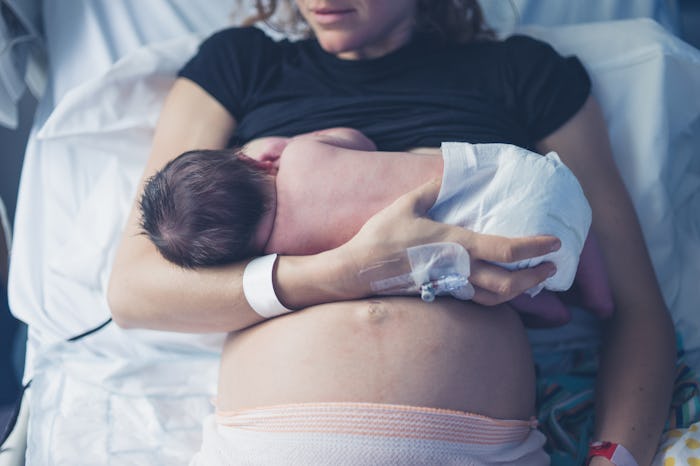Life
Eye-Opening New Survey Finds Mothers' Wishes For Maternity Care Often Go Ignored
We often overlook just how selfless and sacrificial motherhood is and how truly life-changing and scary childbirth can be for many women. And while many women have an idea of how they want their experience to be, an eye-opening new survey has found that mothers' wishes for maternity care often go ignored, which is a pervasive issue that we should not only be addressing, but actively working to rectify.
The research — conducted by the National Partnership for Women & Families, the California Health Care Foundation, and the Yellow Chair Foundation — found that the needs and wants of mothers in delivery are very often disregarded.
The survey — titled "Listening to Mothers CA" and included information from 2,539 women — found that, for example, 74 percent of women believed that childbirth should not be interfered with unless medically necessary, and yet only 5 percent gave birth without medical intervention.
The research also found that 2 in 5 women experienced "extensive use" of interventions to induce birth, despite the fact that 1 in 3 did not show high-quality evidence of need. In other cases, roughly 3 in 10 women were told that their pregnancies needed to be induced because of their baby's size, but more than 4 in 5 women had babies that were within the normal range at birth, according to the survey.
The research also showed that about 6 in 7 women who had "one or more" C-sections in the past gave birth with the same method again, even though "nearly half" of the women who had repeat C-sections" had wanted to give birth vaginally, or VBAC (vaginal birth after cesarean).
"About half who were interested said they had not had the option to plan a VBAC, mostly due to refusals by providers and hospitals rather than current health concerns," the survey said in its findings. "White women had twice the rate of VBAC as Black women, and women with midwives as prenatal care providers were far more likely than women with obstetricians to have a VBAC."
CNN recently reported that rates of C-sections are on the rise, and generally account for about 12.1 percent of the worldwide population.
Additionally, the research found use of pain medication was high, with 3 in 4 having regional analgesia (epidural or spinal) and only 1 in 6 patients used no pain medication whatsoever, according to the survey. For those who did not want to use medication, alternative methods of pain relief such as the use of tubs and showers were limited, and even 1 in 3 women were not offered any other methods for drug-free pain relief, the survey reported.
It's evident that one of the major issues women face is that many want their bodies to be able to process labor and delivery naturally if possible, and without intervention unless medically necessary.
"Women want greater access to proven, high-value forms of care, including access to midwives, doulas, and birth centers," a press release for the study shared.
This probably wouldn't come as a surprise to anyone familiar with how desperately we are in need of new and more inventive labor and delivery protocols, given that the U.S. is one of the "most dangerous places to give birth" in the developed world with a maternal mortality rates continuing to rise, as LiveScience reported in 2018.
The argument, according to an investigation from USA Today, is that though health care providers do have the technology to care for these women properly, they aren't. USA Today also noted that though the rest of the world continues to improve in terms of maternal injury and mortality, the U.S. is getting worse, and that's simply unacceptable. And, according to the Harvard School of Public Health, this is disproportionately true for minority women.
The California Health Report also noted that doctors are "failing" to listen to Black mothers, finding that 4 in 10 women "reported that a health professional tried to induce labor by using medicine or other methods" and "three-quarters of women who felt pressured to have labor induced in this way ended up having the procedure."
Ultimately, it seems that there's a gap between what mothers need and what they're being offered, and it's one that we need to work on closing. This Mother's Day — and every day, really — we need to consider the extensive sacrifices women make physically, mentally, and emotionally to become parents, and start demanding that their safety, wants, concerns, and comfort be taken much more seriously.
